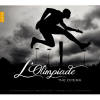Texte paru dans: / Appeared in:
*

International Record Review - (06/2012)
Pour
s'abonner / Subscription information
Naïve
V5295

0822186052952
Consultez toutes les évaluations recensées pour ce cd
~~~~ Reach all the evaluations located for this CD
It was inevitable in this year of Olympic fever (or Olympic fatigue) that L’Olimpiade going to put in an appearance or two on the operatic stage, with productions in its most familiar Vivaldian guise at Garsington Opera and the Buxton Festival. I’m not sure that a plot based on cheating (false identity) to win the hand of the daughter of the event organizer is one the IOC would necessarily want to associate with the modern Games, but an opera set during the Ancient Greek Olympics was always going to be an irresistible draw for festival programmers. Licida fails for Aristea, daughter of King Clistene. When she’s offered as the prize for the winner of the Games, Licida (who’s not much of an athlete) enters his exiled best friend Megacle (several times Olympic champion) under his name. Throw in Licida’s former lover Argene and the added complication that Aristea turns out to be his sister and you have the perfectly convoluted Baroque opera plot.
In 1734 Antonio Vivaldi was the second composer to use Pietro Metastasio’s libretto, written the previous year for an operatic setting by Antonio Caldara. Many composers in the eighteenth century subsequently wrote their own versions, making L’Olimpiade one of the most common operatic subjects. Famous singers would often bring their own favourite arias from previous versions, so audiences would grow used to the idea of patchwork, or pasticcio, operas stitching together arias by different composers. Pasticcio can also be translated as ‘mess’ and it’s debatable how well such an opera can cohere as a whole.
The Venice Baroque Orchestra under Andrea Marcon has performed versions by Baldassare Galuppi (preserved on DVD) and Domenico Cimarosa, while the conductor employed in the present recording, Markellos Chryssicos, has led performances of the original Caldara opera in Athens. In exploring Galuppi’s opera, according to Julian Fifer’s booklet note, when the vast array of versions composed became apparent, the idea of presenting a pasticcio with arias representing each was put forward, resulting in the present recording, which is also being toured around Europe this summer. Recitatives are excised so that we are left with a succession of arias, plus the odd chorus and a single duet. The range of compositional styles, from Caldara (1733) to Giovanni Paisiello (1786), adds to its disjointed nature. As the baton passes from one composer to the next, it’s difficult not to treat it as a contest.
Leonardo Leo lights this particular Olympic flame, with a Sinfonia which turns out to be a bit of a damp squib compared to others I’ve heard by Mysliveček, Hasse, Pergolesi and Cimarosa, any of whom offer a more exciting opening.
Vivaldi’s sole contribution, ‘Mentre dormi’, stands head and shoulders above the rest, a melting aria for Licida, with plucked and strummed accompaniment, to wish his friend Megacle sweet dreams. It’s taken at a daringly soporific pace here, but Franziska Gottwald sustains it well, although she is not blessed with as lusciously dark a voice as Sara Mingardo on the complete recording in Naïves Vivaldi Edition. One might wish for more from the Red Priest, given the sheer quality of this aria, but in the booklet note, the stated aim of this project is to introduce arias by lesser-known composers, so Vivaldi’s is very much a guest appearance.
Vivaldi aside, contenders for the compositional olive wreath include Pergolesi, Hasse, Mysliveček, Cherubini and Caldara, any of whose operatic versions I’d wish to hear complete. Argene’s aria ‘No, la speranza più non mi alletta’ as set by Pergolesi is excellent, sung with vocal athleticism by the superb Karina Gauvin. She consistently provides the most rewarding singing on this release, her rendition of Sarti’s setting of ‘Oh care selve, oh cara felice libertà!’ is lovely, with plenty of pastoral flute accompaniment for her character, who has fled Crete and is living disguised as the shepherdess, Licori. Caldara is represented only once, with Aristea’s ‘Grandi, è ver, son le tue pene’ featuring delightful coloratura runs from Ruth Rosique, a bright-voiced soprano.
Aminta, Licida’s tutor, gets only two arias. I wonder if countertenor Nicholas Spanos had any say in which versions were selected for him, because he scores a ‘double-Hasse’, the first of which, ‘Siam navi all’onde algenti’, is a terrific aria, complete with burbling bassoon and dramatic string writing, with fiery singing from Spanos. Hasse also contributes choruses and Megacle’s opening aria, sung by the fine mezzo Romina Basso, who also earns a fantastic setting of ‘Se cerca, se dice: “L’amico dov’è?” by Cherubini; it’s terrific stuff, full of Sturm-und-Drag passion and high among my gold medal contenders.
There is Mozartean grace in Mysliveček’s aria for Clistene., ‘Del destin non vi lagnate’. However, Nicholas Phan has quite a strident tenor which is not always easy on the ear in this repertoire, where his coloratura runs are laboured. Magdalena Kožena has recorded a couple of Argene’s arias by Mysliveček and I’d be keen to hear more.
There are disappointing efforts from Paisiello (unremarkable), Gassmann (a plodding duet) and Jommelli (long-winded), but a patchwork of this kind is always going to contain variable material. I regret the lack of lower male voices — the character of Alcandro, Clistene’s confidant, is excised here as he had no arias in Metastasio’s original libretto (this didn’t stop Vivaldi composing a couple for him).
The playing of the Venice Baroque
Orchestra under Chryssicos is extremely fine, full-bodied and alert string
playing with characterful wind contributions. This is a useful exploration
of the compositional history of L‘Olimpiade in attractive performances and I
hope that complete versions by some of these composers are forthcoming once
the Olympic frenzy is over.
Fermer la fenêtre/Close window
Cliquez l'un ou l'autre
bouton pour découvrir bien d'autres critiques de CD
Click either button for many other reviews


